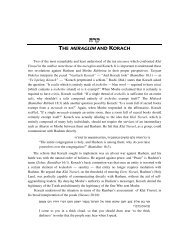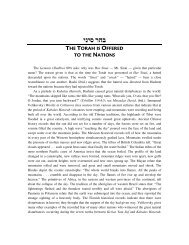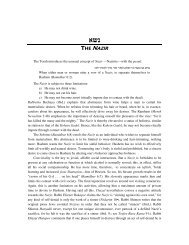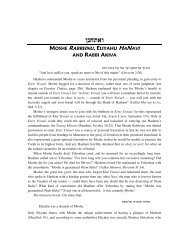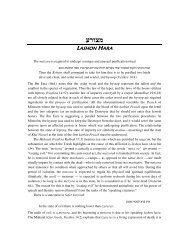Shelomis and Her Sons - Parsha Illuminations
Shelomis and Her Sons - Parsha Illuminations
Shelomis and Her Sons - Parsha Illuminations
You also want an ePaper? Increase the reach of your titles
YUMPU automatically turns print PDFs into web optimized ePapers that Google loves.
אמור<br />
SHELOMIS AND HER SONS<br />
Dasan, the husb<strong>and</strong> of <strong>Shelomis</strong> bas Divri, was forcibly evicted from his home at dawn by his<br />
Egyptian slavemaster. His wife <strong>Shelomis</strong> had apparently caught the Egyptian’s eye, resulting in<br />
this staged event. Now the slavemaster could be alone with her. Once he had removed her<br />
husb<strong>and</strong> from his home, the Egyptian entered <strong>and</strong> had relations with <strong>Shelomis</strong>. Since she thought<br />
that the Egyptian was her husb<strong>and</strong>, she did not protest, <strong>and</strong> she become pregnant from him. The<br />
next day, when the Egyptian realized that Dasan was aware of what had transpired, he provoked<br />
<strong>and</strong> punished him (Shemos Rabbah 1:28).<br />
That was the day Moshe Rabbeinu left the protective environment of Pharaoh’s house <strong>and</strong><br />
sought to align himself with Klal Yisrael (Ramban, Seforno, Shemos 2:11). Moshe wished to<br />
avenge the unjust punishment of Dasan, <strong>and</strong> so he struck the Egyptian. Moshe’s intention was to<br />
hit the Egyptian, not to maim him; but this was one of those instances where the end result was<br />
more severe than what was intended (Rabbeinu Saadyah Ga’on, Mishlei 17:19). The Egyptian<br />
died.<br />
Within the entire episode of Galus Mitzraim — the Exile of Egypt — the story of <strong>Shelomis</strong><br />
marks the only instance of illicit relations between a Jew <strong>and</strong> a Gentile (Shemos Rabbah 1:28).<br />
<strong>Shelomis</strong> is blamed for this tragedy due to her being too talkative to strangers. She would go out<br />
of her way to greet <strong>and</strong> say “Shalom” to everyone she encountered, hence the name “<strong>Shelomis</strong>”<br />
(Vayikra Rabbah 32:5). This unflattering characterization is reminiscent of the characterization of<br />
Dinah as a “yatzanit” — one who goes out frequently (Rashi, Bereishis 34:1). Dinah had a<br />
gregarious personality <strong>and</strong> was interested in exploring her new environment. She should have<br />
remained within the protective custody of her father’s house, but instead she yielded to her<br />
adventurous instincts <strong>and</strong> w<strong>and</strong>ered into a strange area. This resulted in the tragic encounter with<br />
Shechem son of Chamor. Thus, Dinah, by dint of her inquisitive nature, is also blamed for her<br />
own downfall. Controlling one’s impulses is vital for living safely <strong>and</strong> modestly.<br />
Similarly, Rashi (Devarim 22:23) uses the Sifri to explain the sin of the na’arah me’orasa —<br />
betrothed virgin maiden — in the city. The betrothed maiden is found by a man in the city, <strong>and</strong><br />
together they commit an immoral act. “As a result of this he lay with her; a breach invites a thief.<br />
But if she had remained at home, this would not have befallen her.”<br />
<strong>Shelomis</strong> is blamed for her own downfall because she would not control her exuberant <strong>and</strong><br />
unnecessary urge to greet everyone. <strong>Her</strong> unnecessary greeting of this Egyptian taskmaster is what<br />
caught his eye. Shlomo Hamelech states (Mishlei 10:8): “but a prating fool will weary<br />
(yelaveit).” This is interpreted by Targum Yonasan (ibid.): “but the fool is caught by his lips.”<br />
Self-control is essential for self-preservation.<br />
The Maharal echoes the sentiment of numerous Midrashim. <strong>Shelomis</strong> did not intentionally<br />
violate any precept. In fact, she thought she was lying with her husb<strong>and</strong>. Nevertheless, she is
called a zonah — harlot — by Chazal because she had relations with a gentile. She is, in fact,<br />
responsible for bringing this tragic episode upon herself. She did not exercise self-control, but<br />
rather was “a prating fool.”<br />
<strong>Shelomis</strong> transmitted a similar character defect to her two sons. The manifestation of<br />
Shlomis’ lack of self-control took the form of being too talkative. In her sons, this defective trait<br />
manifested itself in the form of a quarrelsome personality. The “Ish Hayisraeli” — “Israelite<br />
Man” — with whom the Mekaleil — the one who cursed — feuded (Vayikra 24:10) was his halfbrother,<br />
the son of <strong>Shelomis</strong> <strong>and</strong> her Jewish husb<strong>and</strong>. The two brothers were arguing because the<br />
son of the Egyptian father wanted equal rights of inheritance with the son of the Jewish father.<br />
The Torah lists Dasan as a scion of Sheivet Reuvain (Bamidbar 26:9), while this episode actually<br />
occurred in the camp of Sheivet Dan. The reason for this was that <strong>Shelomis</strong> bas Divrei was of<br />
Sheivet Dan, <strong>and</strong> her offspring’s claim in Klal Yisrael was through her. In effect, this dissension<br />
challenged the Torah’s h<strong>and</strong>ling of matters related to yichus — inheritance <strong>and</strong> genealogy. The<br />
consequence of this dispute was that the Mekaleil cursed the name of Hashem (see Zohar,<br />
Vayikra 24:10).<br />
The Torah employs an unusual manner in describing the two disputants:<br />
בן הישראלית ואיש הישראלי<br />
“the son of an Israelite woman <strong>and</strong> the Israelite” (Vayikra 24:10).<br />
The Abarbanel (ibid.) explains that the Torah is emphasizing that both brothers are to blame,<br />
because they fought within the machaneh (camp). They should have fought out in the open field,<br />
<strong>and</strong> there “Kol de’alim gabar” — “Whoever prevailed would be declared the victor” (Gittin 60:;<br />
see Bava Basra 34:). The right of possession in cases in which the judge is unable to decide is<br />
determined by he who is more powerful. The fact that they fought within the camp indicated that<br />
they both were dishonorable, <strong>and</strong> resulted in catastrophe.<br />
Similarly, the Kli Yakar (Vayikra 24:10) <strong>and</strong> the Or Hachaim (ibid.) comment on the fact that<br />
neither of the disputants’ names are mentioned, indicating that they are both culpable. They both<br />
suffered from defective ancestry. Hence, the Torah states, “<strong>and</strong> they quarreled in the camp,”<br />
indicating that they were individuals who were constantly involved in strife.<br />
Rabbeinu Bechaya (Vayikra 24:11) states that despite the genetic input of a father, man’s<br />
character is primarily influenced by the maternal genetic contribution. Hence, the Torah mentions<br />
<strong>Shelomis</strong> only after the narration of her children’s sin to indicate that she was the one responsible<br />
for their aberrant character. This is also the reason that the Navi identified the various kings of<br />
Klal Yisrael by their mothers’ names (Melachim I 22:42; 15:2). This principle is underscored<br />
when the Torah goes into unusual detail in relating the story of Amram <strong>and</strong> Yocheved (Shemos<br />
6:20). The point made is that it is no wonder the offspring were three outst<strong>and</strong>ing tzadikim —<br />
their mother was an extremely righteous individual of the highest calibre. David Hamelech<br />
exclaims in Tehillim:<br />
אני עבדך בן אמתך<br />
“I am Your servant, son of Your h<strong>and</strong>maid...” (Tehillim 116:16).
David attributed all his accomplishments to the fact that he was the son of a virtuous mother,<br />
because the major factors in the character development of an individual are maternally derived<br />
(Redak, ibid.).<br />
Lavan greeted Yaakov Avinu with the expression:<br />
“You are my bone <strong>and</strong> my flesh” (Bereishis 29:14).<br />
אך עצמי ובשרי אתה<br />
This salutation intimated that Lavan felt kinship to Yaakov through both of his parents (Vilna<br />
Ga’on, Kol Eliyahu, ibid.). The Gemara states that the father’s physical contributions to his<br />
offspring are tendons <strong>and</strong> bones while the mother’s contributions are flesh <strong>and</strong> blood (Nidah 31•).<br />
Chazal recognized that the real physical essence of man is flesh <strong>and</strong> blood. That is how man is<br />
consistently identified, <strong>and</strong> that is the mother’s legacy to her offspring. The Torah clearly<br />
emphasizes this :<br />
For the life of the flesh is in the blood (Vayikra 17:11).<br />
כי נפש הבשר בדם הוא<br />
At the time of conception, the angel Lilah appears before Hashem inquiring about the<br />
embryo’s fate. Will he be strong or weak, wise or foolish, rich or poor? No questions regarding<br />
righteousness are asked — for virtue is the only matter not predetermined. That element of<br />
bechirah is largely influenced by the endowments of the mother. Middos — character traits —<br />
can be molded by <strong>and</strong> taught to the individual. Techunos encompass the innate character of an<br />
individual which is not subject to change. This aspect of human development is determined by the<br />
mother. That is why David Hamelech shouted out, “I am Your servant, son of Your h<strong>and</strong>maid”<br />
(Tehillim 116:16). David understood that whatever he was <strong>and</strong> whatever he accomplished in large<br />
measure was due to who his mother was.<br />
Resolution of yichus — inheritance <strong>and</strong> genealogy — is determined by the father, but the<br />
most basic, the most elementary measure of who is a Jew can only be certified by the mother.<br />
Mothers are invested with the ability to define their child. Hence, the reverse is also true:<br />
<strong>Shelomis</strong> bas Divri is defined by her offspring.<br />
aA



